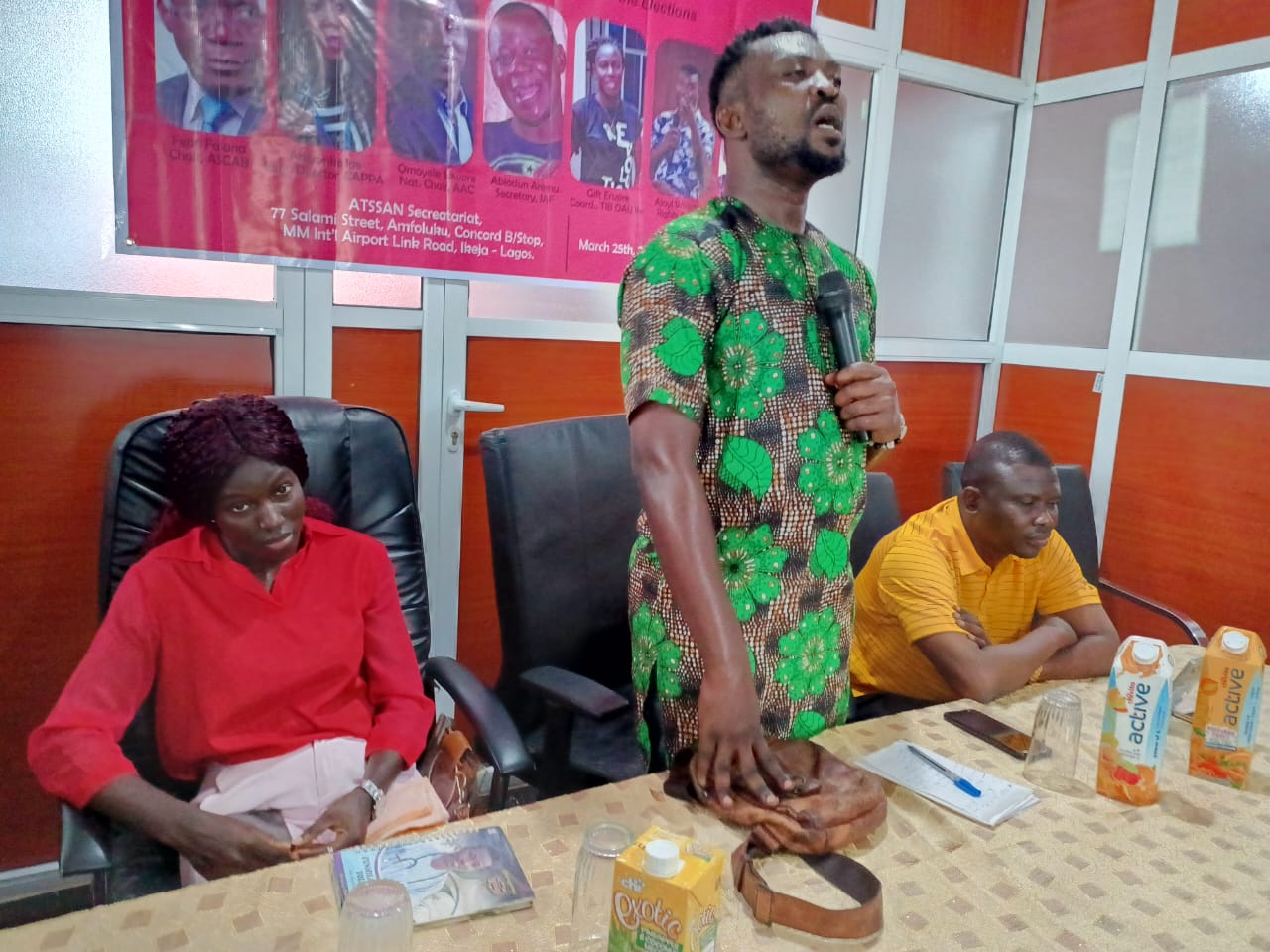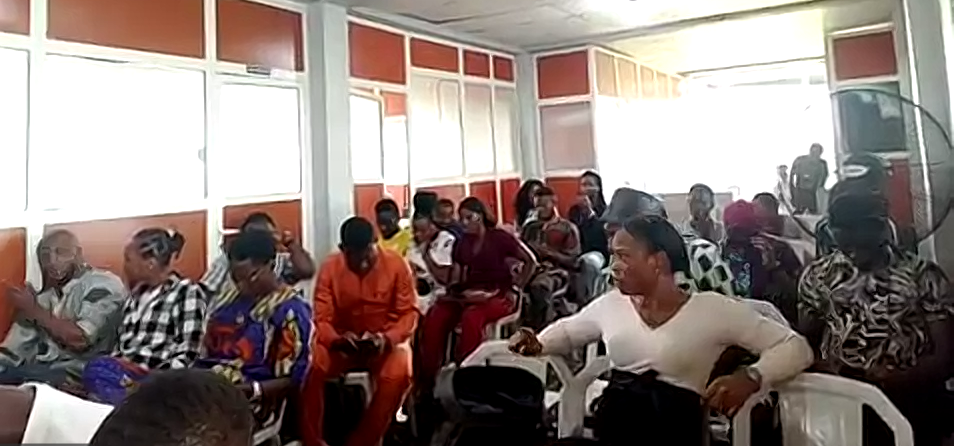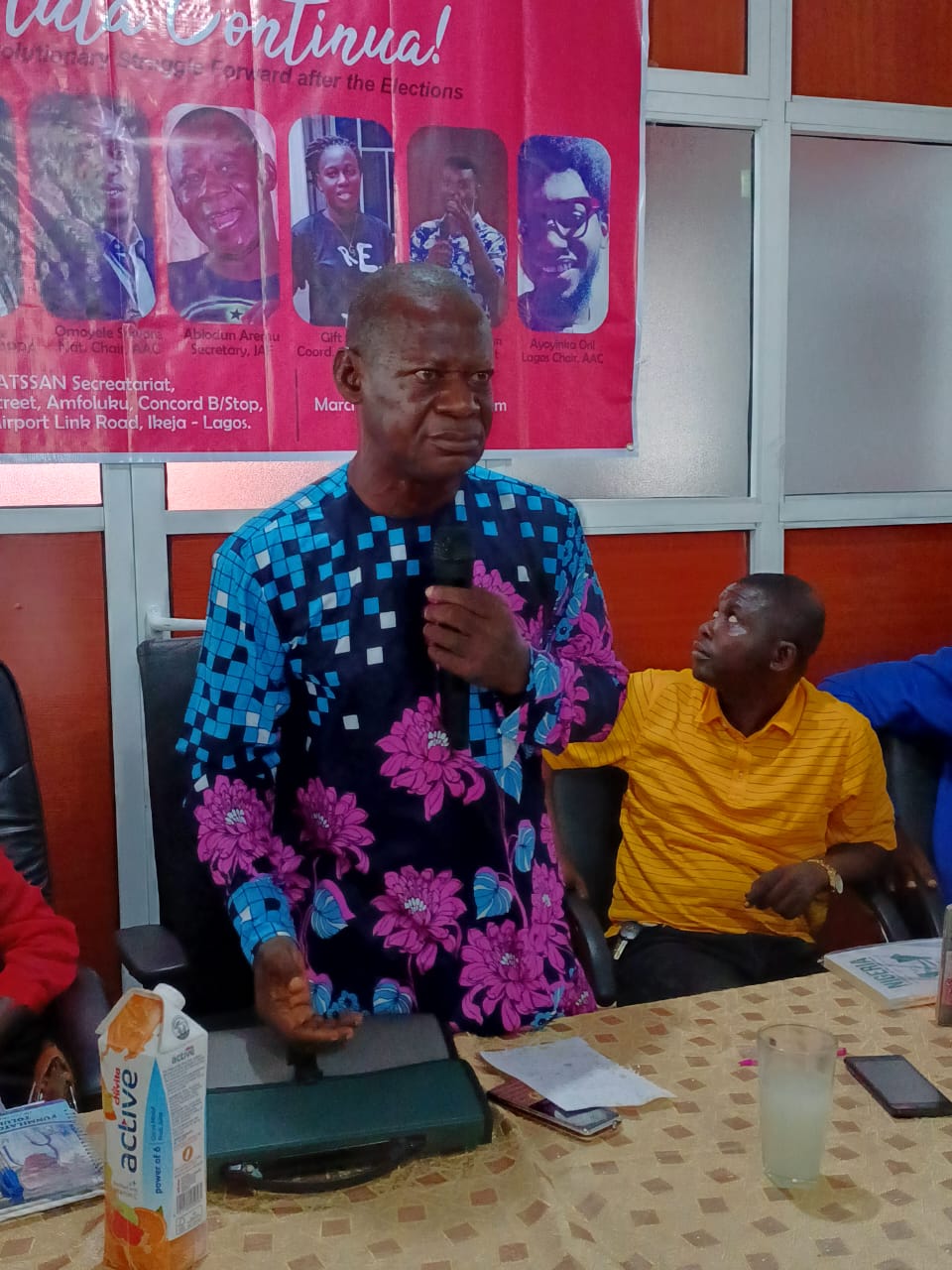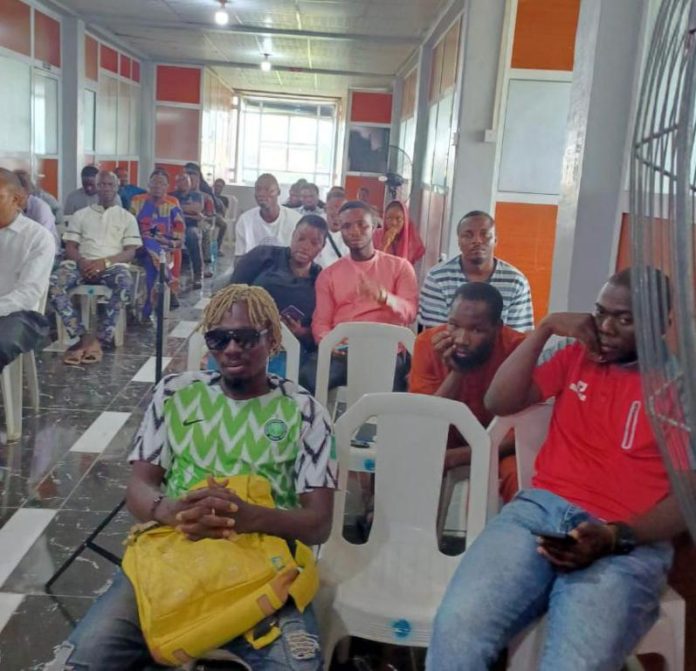Almost sixty working class and youth activists participated actively in the public symposium jointly organised by Socialist Workers League (SWL) and African Action Congress (AAC) at the ATSSSAN union headquarters in Ikeja on 25 March. And thirty more joined the hybrid programme online. The theme of the symposium was Aluta Continua: taking revolutionary struggle forward after the elections.
Lead speakers included Aderonke Ige, Associate Director, Corporate Accountability and Public Participation in Africa (CAPPA); Ayoyinka Oni, Chair AAC Lagos state; Gift Erupre, Coordinator Take It Back, OAU Ife, and; Kunle Wizeman Ajayi, former Chair AAC Lagos state and member of the SWL Editorial Board.
Joining the lead speakers in welcoming the participants were Frances Akinjole, Chair of the SWL, and Akeem Olayiwola, the AAC Lagos state gubernatorial candidate. Frances underscored the need for robust discussion so that we collectively analyse the elections and the tasks that are now before us as revolutionaries. Akeem informed that AAC is not simply an electoral machine like the party of the bosses. The party is a party of working-class people for working people’s liberation at the barricades and not just the ballots. He thus encouraged those who want to fight as part of the struggle of the poor masses to liberate themselves, to join the AAC.
Aderonke kicked off the discussion with perspectives on “elections, women and the struggle for social transformation.” She started by saying that “the first step to solving any problem is identifying it.”
Thus, she argued that whilst diverse arguments views are presented on why women tend to be sidelined in political society, we have to understand that this marginalisation of women first and foremost reflects the patriarchy in our society. We should thus have specific responses to some of the often identified causes, but also go deeper to challenging the system of patriarchy.
The argument of culture is one of the false arguments, she said, because “the world is evolving, and culture too is evolving.” So many things have changed, but women’s participation in elections remain marginal.
She called on women to organise, and be ready to make sacrifice, including turning deaf ears to abusive words they might be maliciously called such as “ashewo” simply for standing up for their rights and fighting for a better society.
Aishat, was one of the participants that responded to Aderonke’s thoughtful analysis, She pointed out that “women with radical ideas are repressed.”She also called for activists to always remember the class divide when discussing about women liberation. Women who are part of the ruling class, she stressed, are part of the oppressors of working-class women.
Aishat also spoke on how religion is used as an excuse for the repression of women. She called for deepening political education to debunk the argument that they have to be submissive to follow any religion of their choice. They have to be active in the struggle for revolutionary change. She wrapped up by calling for socialists to take political education to high schools and even if possible primary schools, because people get socialised to accept patriarchy as normal and the exploitative system as the natural order of things, from very early in life.
The next two lead speakers were Gift and Kunle Wizeman. Gift spoke on the challenges of “rebuilding the student’s movement for revolutionary struggle”, while Kunle spoke on “revolutionary politics and the fight for the education sector.”
Gift said that, from the history they met, the average student union activist up to the 1990s was radical, and more often than not, upheld Marxist ideas. But the situation today is different in the students’ movement. Almost all student union leaders and activists are in the movement for what they will get. And even among the few that crave fundamental change in society, the influence of Marxist ideas is very low. Liberal ideas dominate their views of democracy, human rights, struggle, and social change.
According to her, this is a major reason why there was massive support for the “obidients” ticket of the Labour Party during the elections.
She said that students had lost all hope in the APC and PDP, and did not want to vote for either of these establishment parties. And most of the students that are politically active could see and understand that the AAC political programme and candidates were most representative of the interests of students for quality public education at all levels and building a better society.
But they saw elections through the lens of liberal democracy and believed that since AAC’s Omoyele Sowore was unlikely to win, there was no need for them to “waste” their vote. They thus rather voted en masse for the neoliberal ticket of the “obidients.”
Rebuilding the students’ movement, she said, has to rest on massive political education with revolutionary ideas. SWL, AAC, and TIB have to organise series of symposiums and other public events, recruit promising student activists and help them grow in confidence and revolutionary ideas.
Kunle began his presentation with the assertion that “the election has not and cannot resolve any of the main social problems we have in Nigeria.” This is because all the different sections of the ruling class that ran for the office share the same neoliberal capitalist agenda. Revolution, he said, is the solution, and not merely election.

Thus, while we must take elections seriously and utilise the opportunity, they present to put forward our ideas to the mass of working-class people, we must never have illusions in the ballot.
The trade unions have a key role to play in building workers’ power, for revolutionary struggle, he said. But the trade union bureaucracy drags its feet because they are afraid of revolution. This was why they called off the 28 September 2020 would-have-been general strike. But they cannot stop the march of history. This was demonstrated when, just days after they went back on the call for a strike, the EndSARS rebellion shook the country.
He drew attention to both the potential that the EndSARS movement had and its limitations. One of the ideological limitations was that most of those who presented themselves as its public faces, despite claiming it was leaderless, could not see beyond reform and were thus not ready to take the struggle towards a revolutionary end. This laid the grounds for the incorporation of the rebellious Sòròsókè generation into the “obidients” movement.
Kunle enumerated the tasks ahead for revolutionaries in the working class movement and for struggle in the education sector.
These include being involved with workers in their different struggles for improved working conditions and access to quality social services. Connections between elections and the sustenance of the bosses’ power should be made. And the need for working-class people to take their destinies into their hands at the ballots, their workplaces, and communities must always be emphasized.
The ruling class is not concerned with promoting quality public education because their own children do not school there. They have chosen to not fund our public education, leading to massive strikes in the sector. The students, teachers and non-teaching staff need to unite and fight. And the working-class as a whole should give full support to the struggle in the education sector.
Responding to the two leadoff presentations in this session, Juwon pointed out that whilst there was voter apathy in the elections, there were also a sizeable number of first-time voters. Most of these went to the ballots with the hope that their votes could help to bring about a better Nigeria.
As revolutionaries, he said, we know that ballot alone cannot lead to what they seek. We thus have to carry out thorough-going political education to make them realise this, while leading them to our revolutionary banner. We must also deepen our extra-parliamentary struggle.
Fighting at the barricades helps to build the confidence and understanding of the class struggle for people, he said. This is as important for students as for workers. He reminded participants that the Alliance of Nigeria Students Against Neoliberal Attacks (ANSA) was built with several demonstrations organised in campuses across the country to stop tuition fees increment and resist the victimisation of student activists.
Lekan enjoined we need not agonise, but rather organise. Irrespective of ideological limitations, he said, it is a statement of fact that the recent elections marks key changes in the country’s political landscape, with the rise of the “obidients”’ Labour Party, driven by youths as a “third force.” This shows that the youths are getting more conscious. But this was “false consciousness” he said, because they have illusions in what could at best be limited reforms, or even much worse in practice.
But, just as we saw the EndSARS movement’s demands move from “end police brutality” to “end bad government” by the second week of those days of revolts, if we as revolutionaries persevere and organise with the correct perspectives, we can help deepen the rising consciousness along class lines.
Jharmo took the discussion forward from that point. He reminded us that there were people we became “conscious” in 2015, only because of the hope that General Muhammadu Buhari’s candidacy gave with its “change” mantra. He thus argued that we revolutionaries should not mock the false consciousness of the “obidients” but try to win them over to revolutionary consciousness.
He also proffered some ideas on how to rebuild the students’ movement, drawing from his own political experience. The student union had been proscribed when he got into OAU Ife, and management repressed the left groups on campus.
But older cadres who had graduated were not far from the university environment and went the extra mile to groom a new generation of activists with radical ideas. This is an approach that revolutionaries must build on today to help bring about a left renaissance on the campuses.
Proficiency expressed his opinion that “obidients” have a poor sense of the class struggle. He could not understand how anyone who appreciates the dividing line between the haves who exploit and oppress us, and the have-nots who are left with barely enough to live pitiable lives, could ever fall in love with a candidate who is supported by Obasanjo.
Another demonstration of their clear lack of understanding of a sense of class, in his view, can be found int he political programme of the Labour Party candidate. He does not stand for free education or universal access to quality healthcare. Rather, his programme promotes neoliberal solutions that would primarily benefit only the rich and powerful.
He ended his intervention by noting that symposiums are important, but we need to go beyond such to reach down to the grassroots of working people. He called for sustained leafleting and other forms of direct action with educative and mobilisation components.
Building on some of the arguments that had been made, Godfrey also affirmed that the only solution for a better Nigeria and the emancipation of the poor working people is revolution. Revolutionary activists have to conscientise the working masses and youths, to help them appreciate this as the goal of our collective struggle for emancipation.

Remi stressed the fact that violent voter suppression and the politicisation of ethnicity during the last elections are quite unfortunate and condemnable. A major problem that confronts radicals and revolutionaries alike is building a strong and united left.
She warned against not taking elections with the seriousness they deserve, pointing out that the left stood aloof in 1999 when civilian rule was reinstated, leaving the field of play for capitalists and charlatans.
She further raised the view that talking of revolution could put off several sections of working-class people who associate it with violence. She also said “our messages are full of too much grammar.” We should rather pay due attention to organising within the masses, addressing their social, economic and political concerns with them, and building alliances..
She also opined that many “obidients” are in that movement because they want change, but “there was no other credible alternative, in their own mind.” She thus urged revolutionary activists to be more accommodating instead of always chastising the “obidients.”
Abuchi stepped in, calling for revolutionaries to learn from the people.” We have to know what the people think,” he said. This, must be the starting point of any serious left organising. And revolutionary parties like the AAC, he insisted, should plan, with short-term, mid-term and long-term goals of spreading revolutionary orientation within the class we represent.
Idris expressed his appreciation of the internal criticisms that emerged during the discussions. On the left, he said, we do not usually take criticism well. This is often because we assume that since we are fighting for justice, we cannot be wrong. But such an attitude kills radical politics.
He was also glad that there were some women in the hall, and two of the speakers were women, but this was a far cry from 50/50 parity. We should ask ourselves why this is so and what we can do to change that.
He then called on party activists to build on the AAC manifesto. This programme for the revolutionary transformation of Nigeria should be translated into local languages, distributed, and used for widespread political education.
Baba Aye contributed to some issues raised, such as false consciousness, the need for left unity, and the dynamics between reform and revolution.
He agreed with the fact that false consciousness is a dominant ideological state in a class capitalist society. The reason for this, as in all societies based on class exploitation, is that the dominant ideas in any society are the ideas of the dominant classes. He then argued that if all that could exist in the oppressed people’s minds is false consciousness, there would never be a revolution.
But, social-political psychology emerges as contradictory consciousness. By this, he said, “On one hand you have the commonsense of false consciousness, but on the other hand, objective reality pushes people beyond it to the “good sense” that they can change their situation of being exploited and oppressed only by fighting.
He also said that the swing from seeming surrender to false consciousness to the revolt that comes from good sense can be very sharp. To buttress his argument, he pointed to how youths who were spending their time watching Big Brother Nigeria became militants at the EndSARS barricades within days in 2012.
Further building on the EndSARS movement as an example, he added that reformist ideas could be dominant when rebellions start. But more radical ideas gain ground in the course of the rebellion or revolutionary period, especially when revolutionaries do not allow themselves to be subsumed.
During the EndSARS Rebellion, liberals in the movement mobilised to resist the revolutionary ideas put forward by AAC/TIB and Coalition for Revolution (CORE) activists, saying that the struggle should be limited to ending police brutality and not revolution. They even seized and tore copies of the CORE Charter for Total Liberation. But by the second week of the rebellion, the CORE ideas took the upper hand with “Buhari Must Go” rending the air.
Speaking on left unity, he said this is a brilliant idea, and the tendency of SWL is probably the group that has tried its best to promote it in practice. A good example of this is rallying the left to form the All Nigeria Socialist Alliance (ANSA) in 2005.
But a lesson that history shows, and which has been learnt from practice in Nigeria, is that unity should not be considered in a mechanical manner. Nowhere in the world has a total organisation unity of the left been established, and it is also not given that this would be in the best interest of either the flourishing of revolutionary politics or building workers’ power. We should, however, work in non-sectarian ways, with mutual respect, and be able to strike the capitalist together even if we, organisationally, we walk separately.
Wrapping up his intervention, Baba agreed with the importance of organising in the working class and communities beyond elections, as an important theatre of struggle. And he said that TIB showed how concrete steps could be taken in this regard in 2019 with its political work in working-class communities that led to massive demonstrations against crazy electricity bills and epileptic power supply.
Drawing on the words of Amilcar Cabral, he asked the participants to “always remember that the people are not fighting for the ideas the fact that “the people are not fighting for ideas, for the things in anyone’s head. They are fighting to win material benefits, to live better.”
Thus, as revolutionaries, we should intervene in the struggles of working-class people and show the connections, including the limitations of reforms. “We need to fight for and defend reforms without promoting the illusion of reformism”
Ayoyinka Oni and Abiodun Aremu were the lead speakers of the last session of the symposium. Ayoyinka spoke on “grassroots alliance and coalition building for revolutionary politics”, while Arymson spoke on “elections, workers’ power, and the revolution (drawing lessons from other places).”
Ayoyinka started with a song, to highlight the importance of the cultural dimension of the struggle, which is often underappreciated. Connecting with the grassroots, he said, requires the inclusion of our arts and culture. These encompass song, dance, drama as vehicles for political education and mass mobilisation.
He then hammered on the fact that making a revolution includes forging strong linkages between different sections of the working class awakened to the drumbeats of struggle. Ideas and experiences from other places, he said, are important for forging these linkages.
We can show how society can be better when the power of the ruling class are challenged and alternative pathways are shown to confirm that it is possible for us to liberate ourselves and rebuild our society.
He asked revolutionaries not to have illusion in the ballot. AAC activists, he said, had no illusion that we could win in elections such as this. We must fight to win democracy from below.
Buttressing some of the points raised by Ayoyinka, Chidi intervened, asking revolutionary activists to not see themselves as fighting for the poor masses. We rather need to fight with the exploited, oppressed, and marginalised.
Aremu, or Arymson as he is better known, was the last, but definitely not the least, lead speaker. He started by urging the audience of mainly young people, that the youths need to be bold and irreverent to challenge the system. He also urged them to give adequate attention to their ideological development, saying that there is nothing like “senior comrade.”

Youths, he said, are not merely the leaders of tomorrow, they have a stake in how tomorrow is shaped from today. He then spoke extensively on experiences of the Cuban revolution and Burkina Faso under the regime of Major Thomas Sankara, pointing out that people like Fidel Castro and Thomas Sankara were youths when they left their footprints on the sands of time, to the benefit of poor working people.
He then warned that comrades should not think that the struggle or victory of our class is not predestined. We have to shape our lives and society ourselves by waking up to the challenges history puts on our shoulders.
He wrapped up his presentation by commending the organising of the symposium, saying it was timely and the discussions were robust.
Looking at the overarching theme of the symposium, as it gradually came to an end, Baba Aye pointed out that the context of the deepening crisis in Nigeria is that of a world in turmoil. Due to the inability of the capitalist system to take humankind forward.
Years of capitalist triumphalism when the bosses claimed that “there is no alternative” to their exploitative system is unraveling. Working-class people are taking action across the world. Oppressed peoples and communities are also becoming more daring in confronting their oppressors and the state. But all these are taking place with both the benefits of lessons from earlier struggles and the baggage of years of ideological and political setbacks for Marxism as a major influence in the working-class movement.
We as socialists have to be the tribune of the oppressed, standing in solidarity with workers and all oppressed people and communities in Nigeria and across the world.
The five-hour symposium, which is the second to be organised by the SWL this year, ended in high spirits with aluta songs.
by ‘Todun JAGUN









